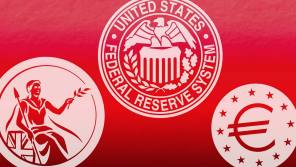

European equities are set to rally in 2017 as they benefit from inflation and close the earnings gap with their counterparts in the US, a leading global equity manager believes.
Dylan Ball, executive vice president of Templeton Global Equity Group, saw inflation as positive for European companies as it will allow them to raise prices, but his optimism has been challenged by advisers.
Mr Ball said as European companies tend to be price-takers when inflation falls, then European firms tend to cut prices to compete with their US and Asian peers.
But when inflation increases again, European companies tend to raise their prices.
This helps explain why the impact of deflation has meant European earnings currently remain 60 per cent below some peaks during the 2008 to 2009 period, while US earnings are 10 per cent above levels of eight or nine years ago.
Mr Ball saw a number of factors pointing towards a sustained period of higher inflation across Europe.
These include higher oil and commodity prices where Templeton's research suggest global demand for oil could support a price above the recent US$55 per-barrel (£43.89) level.
He is also seeing indicators that European economies, particularly Germany, will follow Donald Trump by shifting from monetary to fiscal stimulus, which again will benefit equities.
Lastly, Mr Ball's view on political risk, which is represented by the rise of populist parties and forthcoming elections in France, Holland and Italy, is that it does not drive equity markets over the long-term and largely serves to provide a short-term value opportunity for investors.
This rosy outlook for European equities was contested by advisers.
Mark Dampier, head of research at Hargreaves Lansdown, said the downside of inflation for European equities could be an increase in bond yields.
He said even the current programme of quantitative easing might not keep bond yields low as a revival in the fortunes of the European economy could lead to an end to such intervention.
Stephen Chilcott, chartered financial planner at Addidi Wealth, argued the political risk of populist right wing parties being elected in Europe could not be understated.
"The elections in France will have more of an impact than it has had in the past," he said. "And its all very well to think that Europe is on the plus, but they still have Greece to deal with. That issue will not go away."
david.rowley@ft.com



